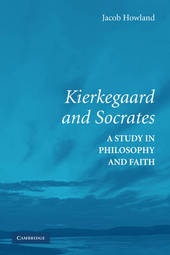
|
Kierkegaard and Socrates: A Study in Philosophy and Faith
Hardback
Main Details
| Title |
Kierkegaard and Socrates: A Study in Philosophy and Faith
|
| Authors and Contributors |
By (author) Jacob Howland
|
| Physical Properties |
| Format:Hardback | | Pages:248 | | Dimensions(mm): Height 229,Width 152 |
|
| Category/Genre | Philosophy
History of Western philosophy
Philosophy of religion |
|---|
| ISBN/Barcode |
9780521862035
|
| Classifications | Dewey:198.9 |
|---|
| Audience | | Professional & Vocational | |
|---|
|
Publishing Details |
| Publisher |
Cambridge University Press
|
| Imprint |
Cambridge University Press
|
| Publication Date |
24 April 2006 |
| Publication Country |
United Kingdom
|
Description
This volume is a study of the relationship between philosophy and faith in Soren Kierkegaard's Philosophical Fragments. It is also the first book to examine the role of Socrates in this body of writings, illuminating the significance of Socrates for Kierkegaard's thought. Jacob Howland argues that in the Fragments, philosophy and faith are closely related passions. A careful examination of the role of Socrates demonstrates that Socratic, philosophical eros opens up a path to faith. At the same time, the work of faith - which holds the self together with that which transcends it - is essentially erotic in the Socratic sense of the term. Chapters on Kierkegaard's Johannes Climacus and on Plato's Apology shed light on the Socratic character of the pseudonymous author of the Fragments and the role of 'the god' in Socrates' pursuit of wisdom. Howland also analyzes the Concluding Unscientific Postscript and Kierkegaard's reflections on Socrates and Christ.
Author Biography
Jacob Howland is McFarlin Professor of Philosophy at the University of Tulsa. He is the author of The Republic: The Odyssey of Philosophy and The Paradox of Political Philosophy: Socrates' Philosophic Trial and has contributed to Metaphysics, Phoenix, the American Political Science Review, and the Review of Politics, among other journals.
Reviews'This reviewer has been enriched by the experience and made to think for the first time about the unlikely but fascinating relationship between a tormented nineteenth century theologian and a towering Greek thinker who cherished wisdom and virtue above all else.' Theology, Ethics and Philosophy
|